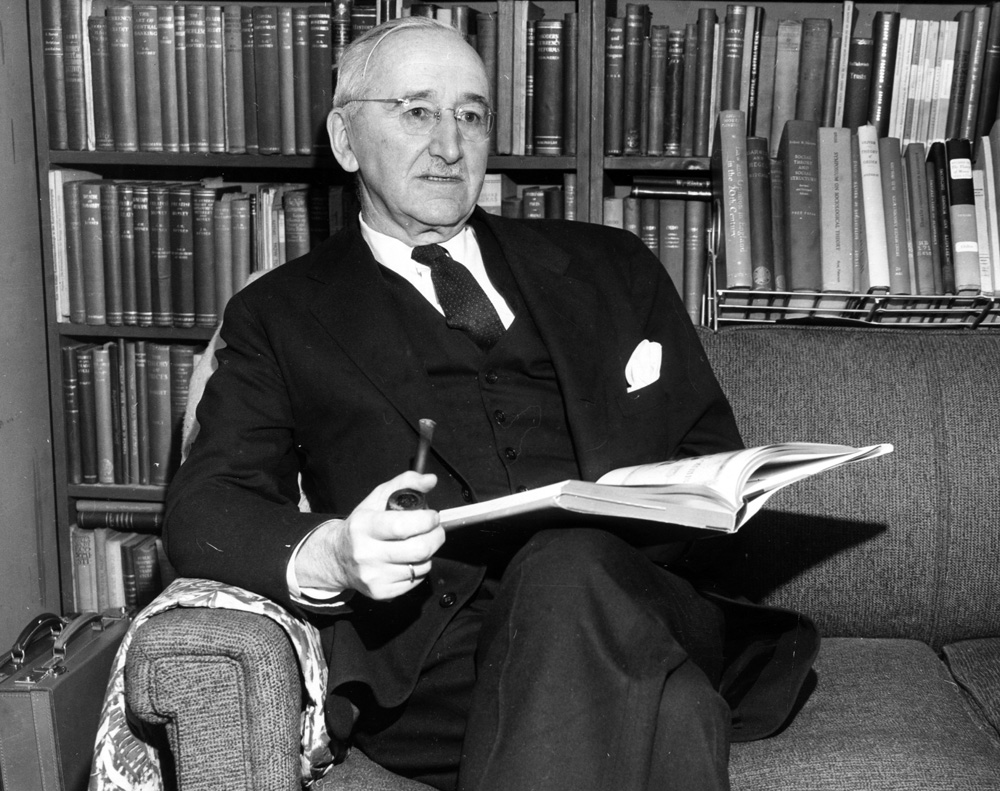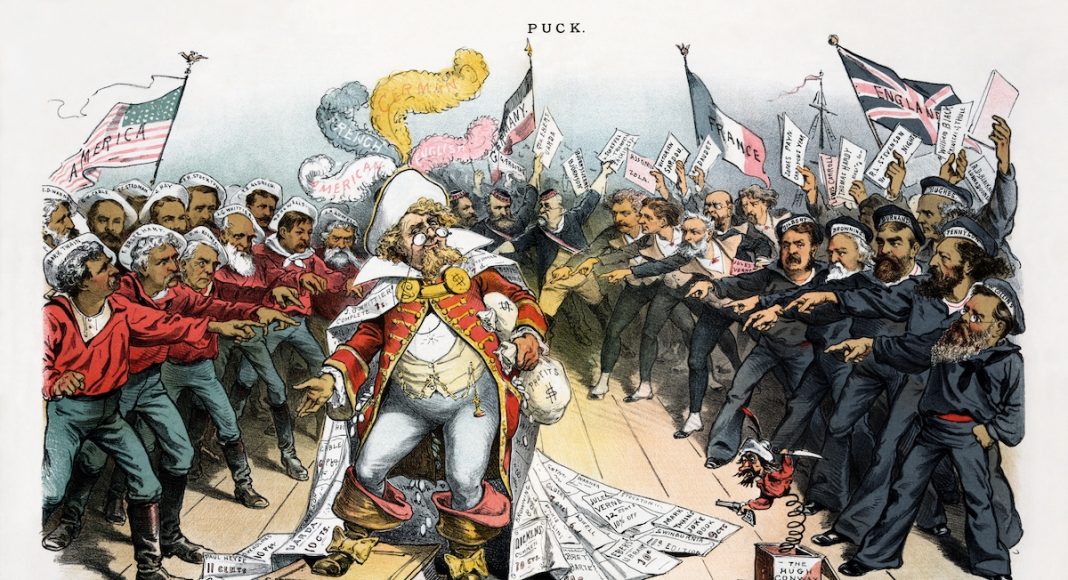Today’s global IP regime is often described by critical scholars bluntly as “neoliberal.” But in fact, the topic of intellectual property rights has been highly controversial within the neoliberal intellectual movement and subject to fierce debates that have stretched for decades.
Editor’s note: The current debate in economics seems to lack a historical perspective. To try to address this deficiency, we decided to launch a Sunday column on ProMarket focusing on the historical dimension of economic ideas. You can read all of the pieces in the series here.
Since the 1980s, intellectual property rights have moved from the periphery of conflicts over the shape and future of the world economy to the center. The shift of the US economy’s competitive edge from manufacturing to entertainment, apparel, pharmaceuticals, and information technology has led policymakers and corporate interests to seek globally enforceable protection of the often intangible and easily reproducible recipes for drugs, or the sequences of bits that become movies or software.
The subject of ever more popular and political discussion and academic scholarship, IP rights have also entered binding international economic law. This culminated in the passage of TRIPS, or the Agreement on Trade-Related International Property Rights, in the World Trade Organization in 1995, representing the first globally enforceable law on patents and copyrights. IP rights have been controversial, especially around the issues of patenting lifeforms, the prohibitive pricing of potentially life-saving drugs in the Global South. Infringements on cultural and intellectual liberty represented by prohibitions on sharing, adapting and “remixing” data of text, music, images, and code were less existentially controversial.
In the critical scholarship, the global IP regime is often described bluntly as “neoliberal,” meaning it corresponds with a political ideology that prioritizes economic freedom above all other human needs and, implicitly, that it corresponds with the opinion of leading intellectuals dubbed neoliberal, including the Chicago School of Milton Friedman and Gary Becker, and the Austrian School of Friedrich Hayek and Ludwig von Mises. One scholar calls IP rights “the core of the neoliberal restructuring of the regulatory architecture of global capitalism.” Another writes that “the domain of intellectual property right law is one of the few areas where the neoliberal program actively supports and endorses increased legislation because it is regarded as important for markets to function effectively.” David Harvey calls “the extraction of rents from patents and IP rights” part of neoliberalism’s “accumulation through dispossession.” Philip Mirowski writes definitively that “the massive fortification of intellectual property is one of the stunning success stories of the neoliberal project.”
Yet, upon looking closer, we are confronted with a puzzle: these blanket statements elide the fact that IP rights were highly controversial within the neoliberal intellectual movement itself. The free market intellectuals that organized around the Mont Pèlerin Society (MPS) have debated over many decades about how, and even if ideas can be treated as property.
“Neoliberals, in other words, were far from IP fundamentalists.”
If maximal IP rights are neoliberal, what should we make, for example, of the signatures of MPS members Milton Friedman, James Buchanan, and Ronald Coase on a friend-of-the-court brief opposing the Copyright Extension Act of 1998? How to explain the fact that Richard Posner, the leading figure of the Law and Economics movement and a member of MPS, has not only suggested that there are “too many patents in America” but cites Hayek in his authoritative work on IP law to the effect that “a slavish application of the concept of property as it has been developed for material things has done a great deal to foster the growth of monopoly and…here drastic reforms may be required if competition is to be made to work.” The text from Hayek is hardly marginal—it comes from one of his addresses at the founding Mont Pelerin Society meeting in 1947.
Neoliberals, in other words, were far from IP fundamentalists. The case of IP shows a range of diversity within the MPS cohort and, thus, within neoliberal thought itself.
A couple of key figures serve to illustrate the point, beginning with Hayek, whose own position shifted little over the decades. In The Road to Serfdom, Hayek suggested that patent law had been one of the measures that had “led to the destruction of competition in many spheres,” and he repeated the statement almost verbatim 25 years later. IP law was a particularly important case for Hayek because of its potential to block the flow of distributed knowledge. As Hayek wrote in The Constitution of Liberty, “Knowledge, once achieved, becomes gratuitously available for the benefit of all. It is through this free gift of the knowledge acquired by the experiments of some members of society that general progress is made possible, that the achievements of those who have gone before facilitate the advance of those who follow.”
For Hayek, patents and copyrights could be a particularly pernicious form of legally-sanctioned monopoly. His skepticism toward IP in the 1940s reflected a consensus both within early neoliberal circles and in the larger economic discourse and even the US Supreme Court in the “antitrust moment” from the New Deal to the 1950s.

Indeed, some of the most commonly cited arguments against strong IP rights come from the ranks of early neoliberals and MPS members. Perhaps the most influential critic of IP from the neoliberal world—and one who did not take the later turn on patents that Chicago School economists did—was the Austrian economist Fritz Machlup, a fellow member of Ludwig von Mises’s seminar with Hayek and also a founding member of MPS.
Beginning in 1950, Machlup wrote sympathetically with Edith Penrose about the tradition of what he called “patent abolitionism” among free trade liberals in the 19th century. Harking back to this earlier period of anti-patent activism, Machlup found forebears for what he took as the unconvincing arguments about the need for patents related to natural law ideas of property as well as incentivizing invention and disclosure.
In 1958, Machlup spoke before a US congressional subcommittee considering the question of what would now be called IP, just as often then called “industrial property.” In calling patents into question, he cited MPS neoliberals, from Mises and Hayek to Arnold Plant and Lionel Robbins.
A striking absence in Machlup’s discussion was the notion that property rights could apply to a commonsense way to ideas as they did to things. As he wrote in 1962, “If a public or social good is defined as one that can be used by additional persons without causing any additional cost, then knowledge is such a good of the purest type. To seek knowledge, to create, acquire, transmit, or retrieve knowledge—all these activities are ordinarily associated with effort or sacrifice of some sort; that is, they are not without cost. To use existing knowledge, however, may be costless.” The most radical critics of IP in recent years, the economists Michele Boldrin and David K. Levine, cast Machlup as their most important forerunner within the economics discipline.
Machlup and Hayek, however, no longer represent the mainstream of neoliberal discourse on IP. For the last several decades, especially within the Law and Economics tradition, most neoliberals have taken what one scholar calls a “consequentialist” rather than an “axiomatic” position, working from a pragmatic evaluation of outcomes rather than inflexible first principles. Because these law and economics scholars, led by Richard Posner, conclude through both modeling and observation of history that patent rights incentive innovation, this is the policy they recommend.
Yet even the consensus around the so-called Posnerian utilitarian position is not absolute. The writings of one-time MPS member Douglass C. North, winner of the Nobel Memorial Prize in Economics in 1993, offers a further example. While North himself had argued for the centrality of patents to innovation, the system that had developed in the US failed to provide adequate incentives. In 2009, North argued that “most of what patents and copyrights are about is the protection of monopolies, not the encouragement of more rapid development.”
Referring to Hayek on the importance of cognitive psychology, North also put the edict of flexible adaptation programmatically: “The world is evolving. What made sense and structured the game yesterday does not necessarily work today and tomorrow.”
The above is far from the “one-size-fits-all” recipe book that neoliberals are often accused of wielding. One need look no further than Hayek’s first MPS speech for a similar sentiment when he said that “patents, in particular, are specially interesting from our point of view because they provide so clear an illustration of how it is necessary in all such instances not to apply a ready-made formula but to go back to the rationale of the market system and to decide for each class what the precise rights are to be which the government ought to protect.”
By this understanding, the attitude of the neoliberal intellectual is not that of a dogmatist but shares some of the traits of alertness they themselves attribute to the entrepreneur. The open-endedness of the evolutionary process of capitalism meant that the devising of new frameworks of incentives was never-ending too. Both critics and advocates of neoliberal thought must do the work of unraveling these histories that unspool over decades to find points of friction between the prescriptions of the intellectuals and the realities of policy and capitalist practice.






